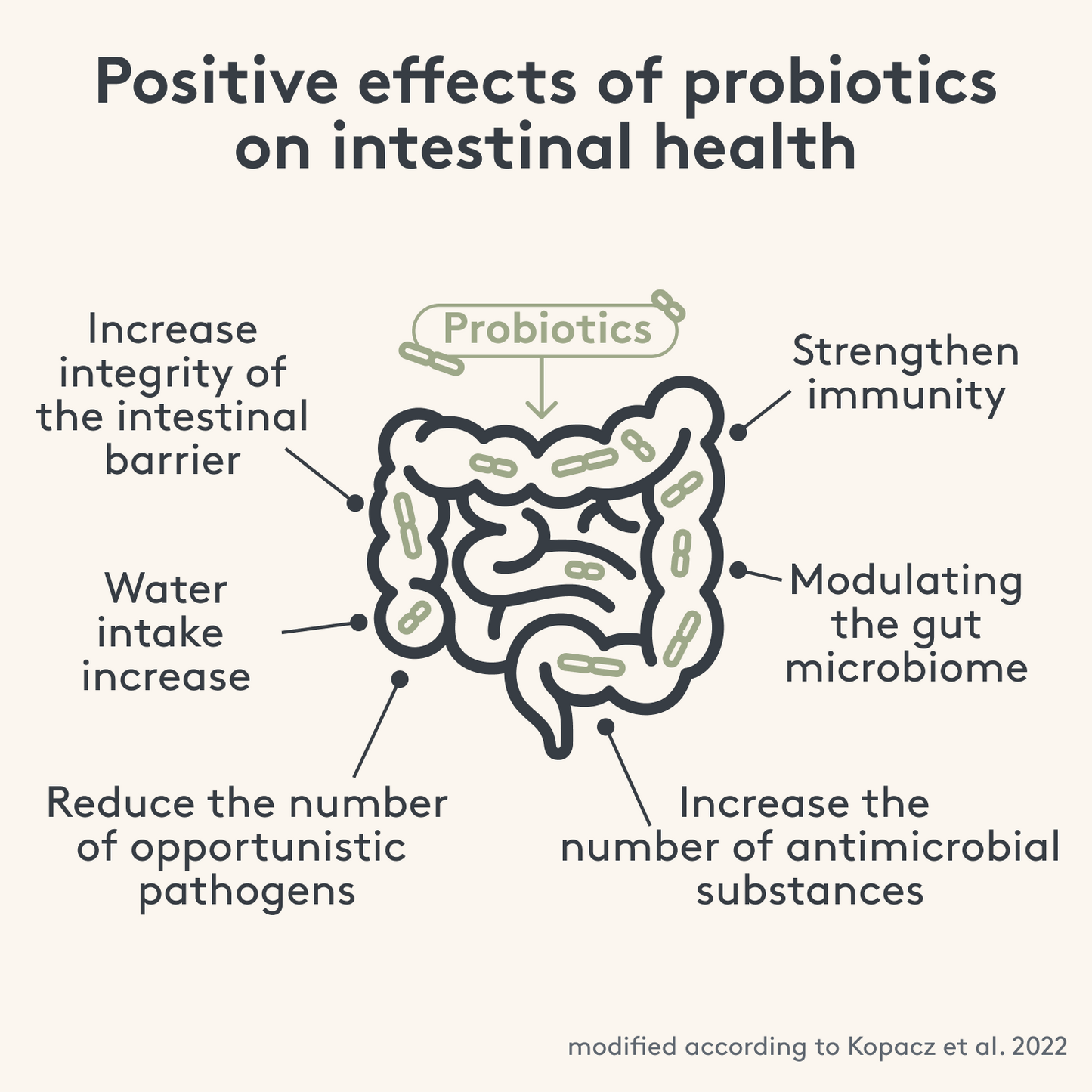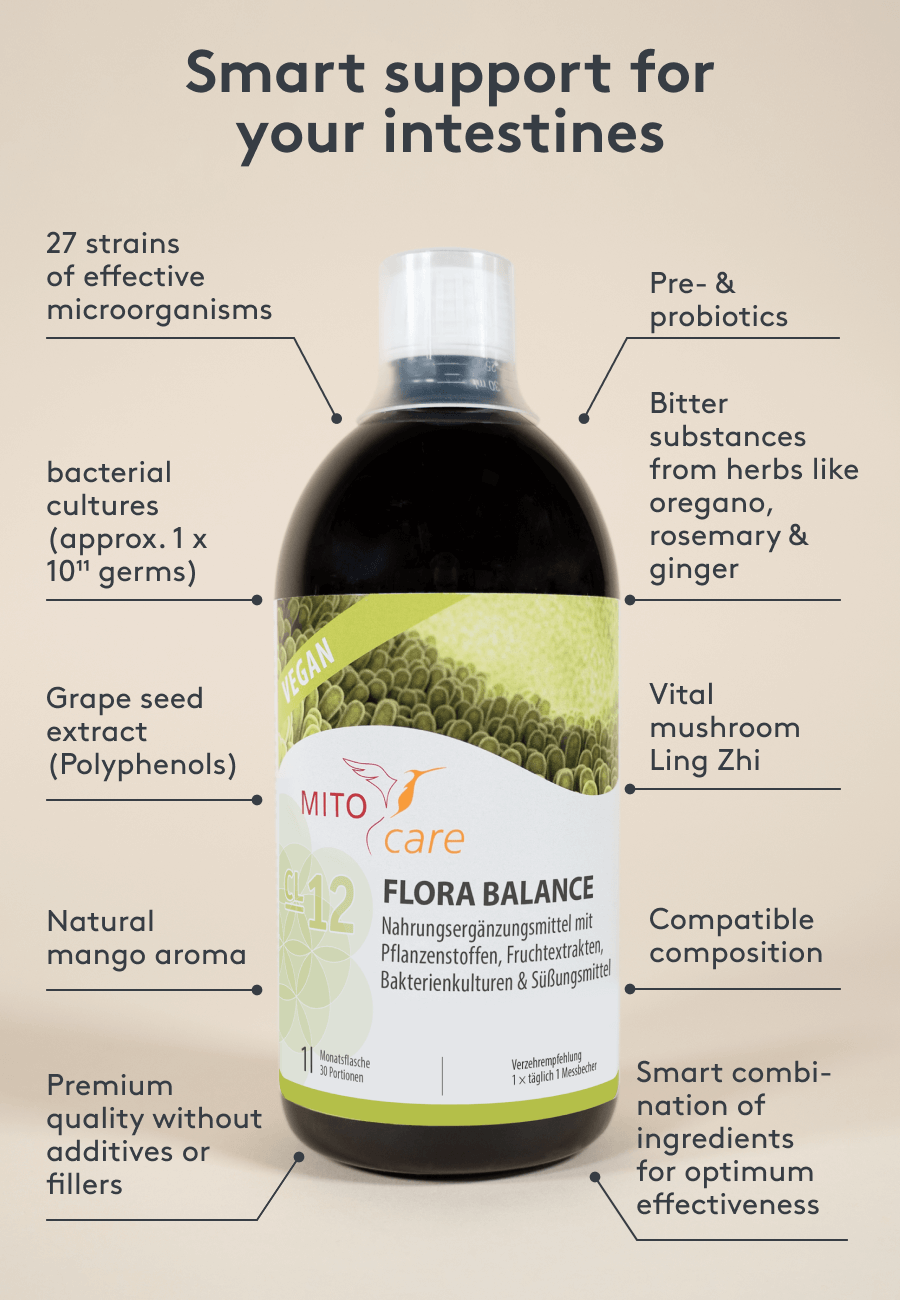What is the gut microbiome?
Every person carries a large number of different types of bacteria, fungi and viruses. A microbiome is the totality of these microorganisms that colonize humans, animals or other living beings in microbial communities. These communities can be found throughout our body – from the skin to the respiratory tract and the gastrointestinal tract.
Trillions of microorganisms live in the digestive tract and help to maintain vital functions. The large intestine in particular is an important habitat for microorganisms and is home to a large bacterial community. The entirety of the small inhabitants of the intestine is known as the intestinal microbiome.
The gut microbiome is more than a random collection of bacteria - it is at the heart of health and affects everything from digestion to the immune system to mood. The community of gut bacteria and their composition are an important factor in your well-being.
Intestinal flora, intestinal microbiota & intestinal microbiome: What is the difference?
In the past, the ecosystem of microorganisms in the intestine was often referred to as intestinal flora. The reason for this is that microorganisms such as bacteria were originally considered to be part of the plant world, i.e. flora. Bacteria now form their own group of living organisms, which is why the community of intestinal bacteria is now referred to as the intestinal microbiome. There is also the term intestinal microbiota.
Microbiota and microbiome are often used synonymously. However, there is an important difference: the microbiota refers to the totality of all microorganisms such as fungi and bacteria. It is part of the microbiome, which also includes the genetic material of the microbes and metabolic products.
Importance of the intestinal microbiome and its microorganisms for your body: 5 positive effects
Current studies and research results show that a balanced gut microbiome is crucial for well-being. Conversely, an imbalance – so-called dysbiosis – can be the cause of many health problems.
The crucial question is: How does the intestinal microbiome affect your well-being? Below we present five important tasks that the intestinal microbiome performs in your body.
1. Optimized digestion and nutrient absorption
The intestinal microbiome ensures that food is optimally broken down into its components and ultimately absorbed. The tiny "helpers" digest complex carbohydrates and fiber. This process produces valuable short-chain fatty acids, such as butyrate, which protect your intestinal cells and ensure proper digestion.¹
If the intestinal microbiome is in balance, this has an immediate positive effect on your well-being: you feel energetic, vital and free from digestive problems such as bloating and discomfort. A microbial imbalance, on the other hand, can lead to numerous digestive problems and have a lasting impact on your quality of life.²
2. Keep your immune system in top shape
Renowned immunologists assume that over 70% of the immune system is located in the intestines. There is evidence that a balanced intestinal flora has a preventive effect on the risk of infections, inflammation and allergic reactions.³ When the intestinal microbiome is in balance, the immune system is intact and you are less susceptible to colds, allergies and other immune diseases.
3. Protection against harmful pathogens
The gut microbiome is the first line of defense against harmful germs and pathogens. It creates a protective barrier by promoting the "good" gut bacteria and fending off "bad" invaders. The helpful microbes even produce antimicrobial substances that fight off harmful bacteria before they can cause harm.⁴
It is particularly important to strengthen the intestinal microbiome after antibiotic treatments in order to prevent potential new infections from occurring. The microbiome can therefore also be seen as an internal “protective shield”.
4. Metabolism, weight management and energy
Have you ever felt like you were having a hard time losing weight despite dieting and exercising? Your gut microbiome could play a crucial role here. Certain gut bacteria can regulate calorie intake and help reduce excess fat.
A balanced microbiome supports metabolism , improves insulin sensitivity and contributes to a healthy body weight.⁵
5. Gut-Brain Axis: A Good Gut Feeling for the Soul
The gut is more than just a digestive organ - it interacts directly with the brain. The microbiome can influence mood, stress levels and even mental health via the so-called gut-brain axis .
The beneficial bacteria in the gut produce neurotransmitters such as serotonin and dopamine, which are often referred to as “happiness hormones.”⁶ A healthy gut can therefore improve mood, reduce stress and reduce anxiety.
Diseases and complaints caused by a disturbed microbiome
If the microbiome becomes unbalanced, it can result in a variety of health problems – for example, disturbances in the intestinal microbiome are associated with digestive problems or even serious illnesses.
Due to the challenges of today, such as constant stress, an unbalanced diet or taking medication, especially antibiotics, a large part of the population suffers from digestive problems at least once in their life. These can manifest themselves in the form of flatulence, diarrhea, persistent pain or constipation.
Irritable bowel syndrome (IBS) is one of the most common intestinal diseases and affects several million people worldwide in varying degrees of severity.⁷ An unbalanced microbiome can play a crucial role here, leading to excessive bloating, abdominal pain and indigestion.⁸
It is also interesting that initial human studies have shown that “fecal microbiota transplantation” from healthy donors can have a positive effect on irritable bowel symptoms in sufferers⁹. This further underlines the crucial influence of the microbiota on human intestinal health.
Lifestyle interventions such as activity in the form of sports, reducing stress or optimising diet can also help to restore intestinal balance and significantly improve the quality of life.⁸
What you can do: Tips for stabilizing the gut microbiome
In order for your intestinal bacteria to feel completely comfortable and for your immune system to be able to do its job and protect you from diseases, your intestines need support. The following three tips show you how you can strengthen your intestinal microbiome through food .
1. Probiotics: The daily health companions
Probiotics are living microorganisms that help the intestines maintain a healthy environment. These “good” bacteria are found in fermented foods, for example
- yogurt
- sauerkraut
- kimchi
- kefir
They can also be taken as a dietary supplement. No matter how you take them, probiotics ensure that the intestines function optimally and support the natural balance of the intestinal microbiome.


2. Prebiotics: Food for good bacteria
Prebiotics are indigestible fiber that serves as food for beneficial gut bacteria. They promote the growth of healthy bacteria and help strengthen the microbiome. Prebiotics are found in foods such as asparagus, bananas and whole grains.
With a diet rich in prebiotics, you ensure that the good bacteria thrive and can optimally perform their protective functions.¹⁰
3. Polyphenols and bitter substances: To support digestion
Polyphenols such as oligomeric proanthocyanidins (OPC) from grape seed extract have anti-inflammatory properties and can therefore promote microbiome health. Initial study data in humans indicate that grape seed extract can have a positive effect on microbiota diversity.¹¹
Also bitter substances , which come from herbs, for example, can have a positive effect on digestion by promoting the production of digestive juices and increasing intestinal activity.¹² They also support the function of the liver and gall bladder, thereby improving fat digestion.¹³
Utilizing synergies: Functional ingredients, pro- & prebiotics as the key to intestinal well-being
In order to optimally support the intestine and the intestinal microbiome, it makes sense to take a holistic approach. In addition to sufficient exercise and a balanced diet, the intake of well-coordinated functional nutrient compounds can also promote intestinal health.
Based on the current data, MITOcare has developed Flora Balance . The dietary supplement combines the positive effects of a probiotic mixture with selected extracts from herbs and plants to holistically support the well-being of the intestine and make optimal use of nutrient synergies.
Many other products for stabilizing the intestinal flora only use individual bacterial strains. In contrast, Flora Balance specifically uses the synergistic effects of 27 high-dose probiotic strains . A well-balanced mixture of herbal and plant extracts rounds off the recipe and supplies the intestines with polyphenols and bitter substances.


bibliography
- Louis, P., & Flint, H.J. (2017). Formation of propionate and butyrate by the human colonic microbiota. Environmental microbiology , 19 (1), 29–41.
- Weiss, GA, & Hennet, T. (2017). Mechanisms and consequences of intestinal dysbiosis. Cellular and molecular life sciences: CMLS , 74 (16), 2959–2977.
- Shi, J., Wang, Y., Cheng, L., Wang, J., & Raghavan, V. (2024). Gut microbiome modulation by probiotics, prebiotics, synbiotics and postbiotics: a novel strategy in food allergy prevention and treatment. Critical reviews in food science and nutrition , 64 (17), 5984–6000.
- Kopacz, K., & Phadtare, S. (2022). Probiotics for the Prevention of Antibiotic-Associated Diarrhea. Healthcare (Basel, Switzerland) , 10 (8), 1450.
- Van Hul, M., & Cani, P.D. (2023). The gut microbiota in obesity and weight management: microbes as friends or foe?. Nature reviews. Endocrinology , 19 (5), 258–271.
- Strandwitz P. (2018). Neurotransmitter modulation by the gut microbiota. Brain research , 1693 (Pt B), 128–133.
- Ford, AC, Sperber, AD, Corsetti, M., & Camilleri, M. (2020). Irritable bowel syndrome. Lancet (London, England) , 396 (10263), 1675–1688.
- Chlebicz-Wójcik, A., & Śliżewska, K. (2021). Probiotics, Prebiotics, and Synbiotics in the Irritable Bowel Syndrome Treatment: A Review. Biomolecules , 11 (8), 1154.
- Boicean, A., Birlutiu, V., Ichim, C., Anderco, P., & Birsan, S. (2023). Fecal microbiota transplantation in inflammatory bowel disease. Biomedicines , 11 (4), 1016.
- Carlson, JL, Erickson, JM, Lloyd, BB, & Slavin, JL (2018). Health Effects and Sources of Prebiotic Dietary Fiber. Current developments in nutrition , 2 (3), nzy005.
- Yang, J., Kurnia, P., Henning, SM, Lee, R., Huang, J., Garcia, MC, Surampudi, V., Heber, D., & Li, Z. (2021). Effect of Standardized Grape Powder Consumption on the Gut Microbiome of Healthy Subjects: A Pilot Study. Nutrients , 13 (11), 3965.
- Überall, F. (2017). Bitter substances for a healthy intestine. Empirical medicine 2017; 66(03): 177-181.
- Höhl, K., Lichtenstein, S. (2020). Bitter substances and components in foods and medicinal plants. NUTRITION REVIEW 8/2020, M472-M479.





